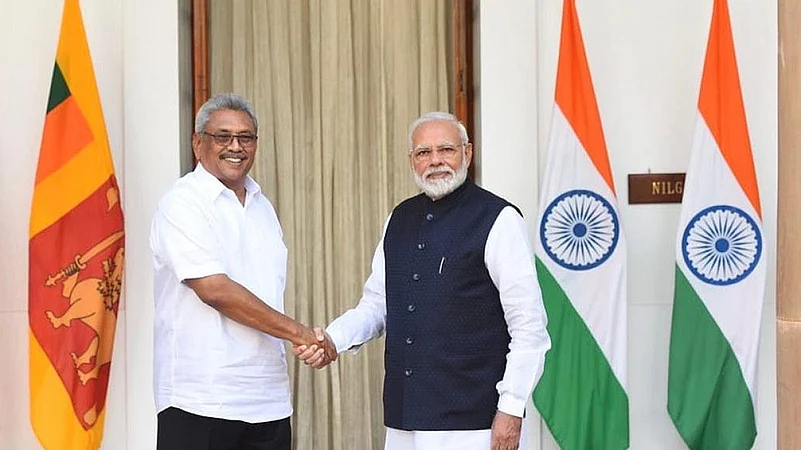It is interesting that Tamil lawmakers from Sri Lanka have chosen this particular time to raise the question of autonomy in the island nation. This is a critical couple of months for President Gotabaya Rajapaksa when rising prices and shortages triggered by a massive foreign exchange crisis have shaken people’s faith in the government. The government is at its weakest point now with dissatisfaction growing by the day.
In fact, President Gotabaya Rajapaksa, while addressing MPs at the opening of Parliament session, pledged to uphold human rights in the island nation. Moreover, he also appealed to Tamil MPs from the northern and eastern provinces for support to restore normal life in these areas. This pledge on human rights and reaching out to the Tamil members is a break from the past for the Rajapaksa ruling family. Since the military victory over the LTTE, it had been triumphalist talk from both Prime Minister Mahinda Rajapaksa and younger brother Gotabaya.

So, it is not surprising that Tamil politicians have chosen to appeal to the Indian Prime Minister at this time. Sri Lanka’s Tamil lawmakers have written a letter to Prime Minister Narendra Modi reminding him of India’s commitment to giving a degree of autonomy and self-rule to Tamil areas in the island state. At the heart of the India-Lanka agreement of 1987, was the 13th amendment which promised a degree of autonomy to Tamil areas while respecting the unity and integrity of the country. Simply put in exchange for independence, the Tamil minorities were promised powers to make decisions for the good of the people living in northern and eastern parts of the island. But even the previous government of President Sirisena and Prime Minister Ranil Wickremasinghe, which was much more attuned to Tamil aspirations for autonomy, could not do much to implement the 13th Amendment.
While some amount of power has been given, the northern province has its own chief minister, the basic issues of control of land and police forces have not been worked out as promised. The devolution of powers from Colombo to the province has been at best half-hearted and the hopes that the Tamil areas would be in complete control of their region has certainly not been granted. Moreover, many Sinhala Buddhist sections in the Rajapaksa’s ruling Sri Lanka People’s Party are against the Provincial Council system, which had devolved some degree of power to the states ( called provinces in Sri Lanka). They want this scrapped and conform to a unitary state, where all power lies with the federal government.
As many as 35 years have passed since the India-Sri Lanka agreement. The Liberation Tigers of Tamil Eelam led by Velupillai Prabhakaran were wiped out by the Sri Lankan army in 2009 when Mahinda Rajapaksa was President. Tamil insurgency is dead and gone. Yet the promise made to the people has not yet been kept. But even the previous government.

"There have been a lot of promises made on the Tamil national question from time to time. Ours is a request to implement them", MA Sumanthiran, a TNA leader was quoted by local media as saying in a report from Colombo. The report said that the letter urged Prime Minister Modi to "ensure Tamil speaking people live with dignity, self-respect, peace and security in the areas of their natural habitation exercising the right to self-determination within the framework of a united undivided country".
India’s Balancing Act :
New Delhi has been pushing for devolution of power from the very start. However, not much was done. India’s relations with the Rajapaksa government are excellent. In his second term, Mahinda Rajapaksa had turned more and more to China. When in 2014, Chinese submarines docked, not once but twice at the Colombo port, alarm bells rang in New Delhi. But now those misgivings have been cleared and India realising the importance of Sri Lanka in promoting its maritime security had wooed the Rajapaksa brothers. The family too realised that good relations with India were a must for survival. Foreign minister Subramanyam Jaishankar, knows Sri Lanka well, having served in the country in his younger days. He had worked hard to turn around the situation. This does not mean that China is bowing out. In fact, foreign minister Wang Yi was in Colombo earlier this month. So, for India, it will be a balancing act between promoting the rights of the Tamil minority in Sri Lanka and not crossing the line to make Gotabaya flip completely to China’s waiting arms. China already has Hambantota port at its disposal, it is building the mega Colombo Port City project, and its footprints are all across the island. India has wrapped up the Trincomalee oil tank scheme. Sri Lanka is crucial to India’s maritime security more so because Chinese naval presence on the Indian Ocean has increased tremendously in the last decade or so. India’s decision to be part of the quad, US, Japan, India, Australia group, is basically to thwart China’s aggressive moves not in the Pacific waters but in the Indian Ocean area. The Indo-Pacific now includes the Indian Ocean.
Tamil MPs will perhaps realise that while New Delhi will privately take up their cause for greater devolution, there will be no angry public statements against the Rajapaksa brothers.



























